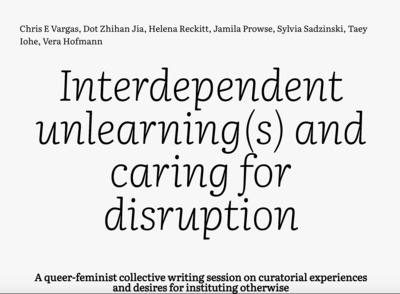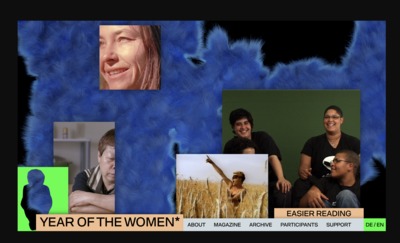Interdependent unlearning(s) and caring for disruption: A queer-feminist collective writing session on curatorial experiences and desires for instituting otherwise
Vargas, Chris E; Zhihan, Dot Jia; Reckitt, Helena; Prowse, Jamila; Sadzinski, Sylvia; Iohe, Taey and Hofmann, Vera. 2022. Interdependent unlearning(s) and caring for disruption: A queer-feminist collective writing session on curatorial experiences and desires for instituting otherwise. The Year of the Women / Jahr der Frau, [Article]
![[img]](https://research.gold.ac.uk/33353/1.hassmallThumbnailVersion/Screenshot%202023-04-06%20at%2009.51.45.png)
|
Image
Screenshot 2023-04-06 at 09.51.45.png - Supplemental Material Download (326kB) | Preview |
|
![[img]](https://research.gold.ac.uk/33353/2.hassmallThumbnailVersion/Screenshot%202023-04-06%20at%2017.33.43.png)
|
Image
Screenshot 2023-04-06 at 17.33.43.png - Supplemental Material Download (3MB) | Preview |
|
|
Text
Interdependent unlearning(s) and caring for disruption_2022.pdf - Published Version Download (5MB) | Preview |
Abstract or Description
Helena Reckitt contributed to this online discussion about curatorial (un)learning(s), wishes and desires, within institutions as well as self-organised feminist and queer spaces. The project was initiated and edited by Vera Hofmann and Sylvia Sadzinski in the context of YEAR OF THE WOMEN* which centered (queer) feminist perspectives and positions of women*, lesbians, inter*, non-binary, trans* and agender people throughout the annual programme, at the Schwules Museum, Berlin.
After an initial meeting during which Hofmann and Sadzinski shared their questions with invited co-authors based in the UK, US, and Germany, the group met for three hour-long co-writing sessions in June and July 2022. Writing together, in no particular order, they cross-referenced and jumped back and forth within the text. One participant, Jamila Prowse, could not join the meetings during the periods of co-writing, but contributed at different times to the shared document.
The text was very lightly edited and proofread. Nothing from the original contributions was deleted. The editors decided to keep the repetitive elements and all unanswered questions as key elements of their original idea, in tune with their advocacy of process-based work instead of polished results.
|
Item Type: |
Article |
||||||
| Additional Information: |
The discussion ranged widely exploring the following questions and issues: - Curating - Disruption/Intervention - Instituting Otherwise -Commons/Commoning |
||||||
| Keywords: |
Feminist Curating, Queer Curating, Activist Curating, Curating and Care, Instituting Otherwise, Commons/Commoning |
||||||
| Related URLs: |
|
||||||
| Departments, Centres and Research Units: |
|||||||
| Dates: |
|
||||||
| Item ID: |
33353 |
||||||
| Date Deposited: |
14 Apr 2023 09:51 |
||||||
| Last Modified: |
14 Apr 2023 09:51 |
||||||
|
URI: |
View statistics for this item...
 |
Edit Record (login required) |

 Tools
Tools Tools
Tools

